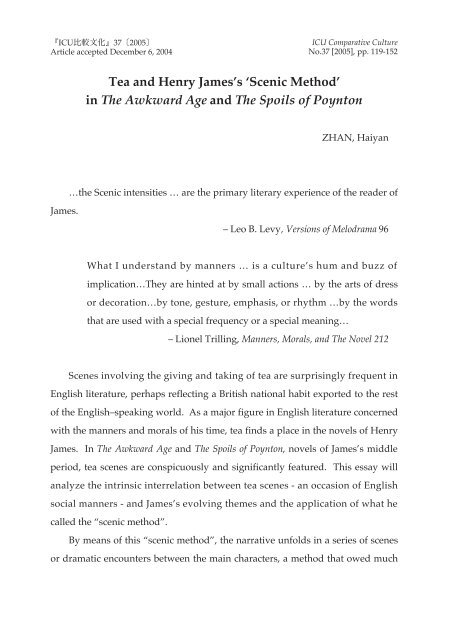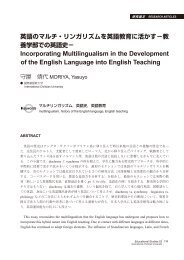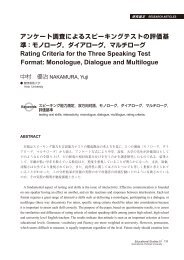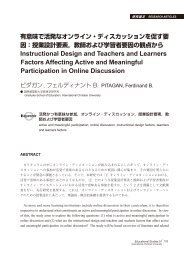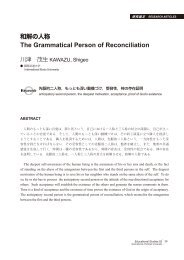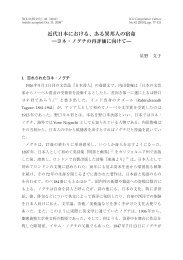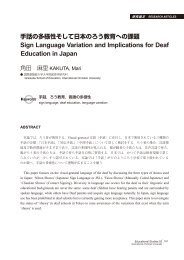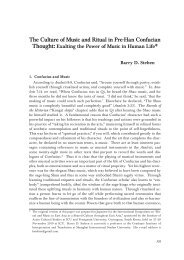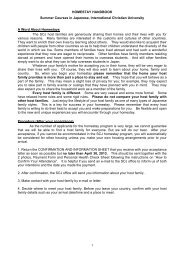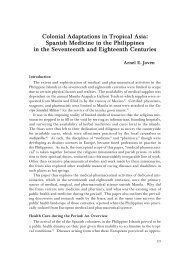Tea and Henry James's 'Scenic Method' in The Awkward ... - subsite
Tea and Henry James's 'Scenic Method' in The Awkward ... - subsite
Tea and Henry James's 'Scenic Method' in The Awkward ... - subsite
You also want an ePaper? Increase the reach of your titles
YUMPU automatically turns print PDFs into web optimized ePapers that Google loves.
120<br />
to his experiments with drama. In 1910, James wrote <strong>in</strong> his Notebook: “Oh, blest<br />
Other House, which gives me thus at every step a precedent, a support, a div<strong>in</strong>e<br />
little light to walk by”(348). <strong>The</strong> “div<strong>in</strong>e light”, accord<strong>in</strong>g to Peter Brooks, “was<br />
that of a fully developed scenic <strong>and</strong> dramatic technique translated <strong>in</strong>to novelistic<br />
form. <strong>The</strong> orig<strong>in</strong>al transcription of <strong>The</strong> Other House from play to novel was the<br />
most tell<strong>in</strong>g demonstration for the author of how the lessons of his grim<br />
theatrical years could be put to use <strong>in</strong> fiction”(162). He refers to Leon Edel <strong>and</strong><br />
Leo B. Levy, who have described the direct effect of the theatrical experience on<br />
James’s novelistic technique from <strong>The</strong> Spoils of Poynton onward, <strong>and</strong> cites Levy<br />
that “the scenic <strong>in</strong>tensities … are the primary literary experience of the reader of<br />
James”(qtd. <strong>in</strong> Brooks, 162). Particularly <strong>in</strong> two books, <strong>The</strong> <strong>Awkward</strong> Age <strong>and</strong> <strong>The</strong><br />
Spoils of Poynton, tea scenes are not only a recognizable theatrical device, but also<br />
provide an ideal sett<strong>in</strong>g to engage the characters with one another.<br />
In Read<strong>in</strong>g Novels, George Hughes observes, “the sett<strong>in</strong>g is of key<br />
importance, s<strong>in</strong>ce it will shape the dialogue. <strong>The</strong> way we speak depends on<br />
where we are” (100). To see how tea scenes – the sett<strong>in</strong>g – shape the dialogue<br />
(the two texts are heavily dependent on dialogue), I will beg<strong>in</strong> with a brief social<br />
history of tea <strong>in</strong> Brita<strong>in</strong>, expla<strong>in</strong><strong>in</strong>g the tradition <strong>and</strong> the cumulated cultural<br />
mean<strong>in</strong>gs of tea <strong>and</strong> tea–dr<strong>in</strong>k<strong>in</strong>g. As mentioned above, tea scenes are scattered<br />
across English literature, <strong>and</strong> <strong>in</strong> mak<strong>in</strong>g some reference to these earlier scenes <strong>in</strong><br />
literary texts, I hope to throw light on how cultural <strong>and</strong> metaphorical mean<strong>in</strong>gs<br />
are imbued <strong>in</strong> tea–dr<strong>in</strong>k<strong>in</strong>g over the centuries, <strong>and</strong> how <strong>Henry</strong> James, as a<br />
recipient of this cultural heritage, used these mean<strong>in</strong>gs to underp<strong>in</strong> the art of his<br />
novels.
<strong>Tea</strong> <strong>and</strong> <strong>Henry</strong> James’s ‘Scenic Method’ <strong>in</strong> <strong>The</strong> <strong>Awkward</strong> Age <strong>and</strong> <strong>The</strong> Spoils of Poynton<br />
121<br />
<strong>Tea</strong>, its social history <strong>and</strong> literary tradition<br />
‘Tak<strong>in</strong>g tea’ is a form of civilized behavior <strong>in</strong> social history. Initiated <strong>in</strong><br />
ancient Ch<strong>in</strong>a, tea–dr<strong>in</strong>k<strong>in</strong>g gradually <strong>and</strong> steadily grew <strong>in</strong>to a culture with wide<br />
<strong>and</strong> profound connections to art, literature, philosophy <strong>and</strong> religion.<br />
<strong>Tea</strong>–dr<strong>in</strong>k<strong>in</strong>g is versatile: performed by the civilized <strong>and</strong> cultivated, it is an<br />
art which produces a genu<strong>in</strong>ely aesthetic <strong>and</strong> transcendental moment away from<br />
everyday life. In daily life, it creates a polite <strong>and</strong> <strong>in</strong>timate atmosphere with<strong>in</strong> the<br />
domestic sphere <strong>and</strong> extends hospitality to visitors. As a social dr<strong>in</strong>k,<br />
tea–dr<strong>in</strong>k<strong>in</strong>g is <strong>in</strong>evitably <strong>in</strong>volved with etiquette – a coded behavior that<br />
functions conspicuously <strong>in</strong> hierarchical societies.<br />
<strong>Tea</strong>–dr<strong>in</strong>k<strong>in</strong>g, hav<strong>in</strong>g been established <strong>in</strong> the East, especially <strong>in</strong> Ch<strong>in</strong>a <strong>and</strong><br />
Japan, both as an aspect of high culture <strong>and</strong> as a long–st<strong>and</strong><strong>in</strong>g tradition, spread<br />
<strong>in</strong>to Europe <strong>in</strong> the late sixteenth <strong>and</strong> early seventeenth centuries. Because of the<br />
respectability <strong>and</strong> popularity it had achieved <strong>in</strong> Eastern societies <strong>and</strong> the highly<br />
developed art of its utensils <strong>and</strong> the <strong>in</strong>terior design associated with it, tea was<br />
quickly adapted by the European courts <strong>and</strong> aristocracies <strong>in</strong> early seventeenth<br />
century, <strong>and</strong> soon made its debut <strong>in</strong> English literature, namely <strong>in</strong> Restoration<br />
comedies, <strong>in</strong> depictions of the life of the upper classes. William Congreve’s <strong>The</strong><br />
Double Dealer (1694), for example, <strong>in</strong>cludes a l<strong>in</strong>e reveal<strong>in</strong>g the chang<strong>in</strong>g social<br />
patterns between the sexes that <strong>in</strong>volved tea. <strong>The</strong> ladies, one character expla<strong>in</strong>s,<br />
were “at the end of the gallery, retired to their tea <strong>and</strong> sc<strong>and</strong>al accord<strong>in</strong>g to their<br />
ancient custom after d<strong>in</strong>ner”. In Colley Cibber’s Lady’s Last Stake (1708), tea is<br />
eulogized extravagantly:<br />
<strong>Tea</strong>! Thou soft, thou sober, sage <strong>and</strong> venerable liquid; thou <strong>in</strong>nocent<br />
Pretence for br<strong>in</strong>g the Wicked of both Sexes together <strong>in</strong> a Morn<strong>in</strong>g; thou<br />
female Tongue–runn<strong>in</strong>g, Smile–smooth<strong>in</strong>g, Heart–open<strong>in</strong>g,
122<br />
W<strong>in</strong>k–tipp<strong>in</strong>g cordial, to whose glorious Insipidity I owe the happiest<br />
moment of my life, let me fall prostrate(193).<br />
William Wycherley’s comedy of 1675, <strong>The</strong> Country Wife, exploits the<br />
fashionability of tea <strong>and</strong> tea–utensils, to stage an outrageously smutty scene, <strong>in</strong><br />
which ‘ch<strong>in</strong>a’ is used as a synonym for sexual <strong>in</strong>tercourse. Half a century later,<br />
<strong>Henry</strong> Field<strong>in</strong>g, <strong>in</strong> his comedy of manners, Love <strong>in</strong> Several Masque (1728), sums<br />
up the use of tea <strong>in</strong> Restoration comedies: “Love <strong>and</strong> sc<strong>and</strong>al are the best<br />
sweeteners of tea”(Field<strong>in</strong>g, 76).<br />
As the novel replaces the drama as the central literary genre, tea–scenes also<br />
beg<strong>in</strong> to play their part here. Novelists like Jane Austen <strong>in</strong> Mansfield Park (1810),<br />
Elizabeth Gaskell <strong>in</strong> Mary Barton (1851), <strong>and</strong> Mary Braddon <strong>in</strong> Lady Audley’s<br />
Secret (1863), br<strong>in</strong>g their characters together over tea. <strong>Tea</strong> is a fem<strong>in</strong><strong>in</strong>e dr<strong>in</strong>k<br />
that highlights female domesticity <strong>and</strong> grace, but it also <strong>in</strong>volves class,<br />
someth<strong>in</strong>g that reveals the gap between the wealthy <strong>and</strong> the poor.<br />
<strong>Tea</strong>–dr<strong>in</strong>k<strong>in</strong>g, limited to the highest social class by its expense <strong>in</strong> the<br />
seventeenth century <strong>and</strong> early eighteenth century, spread to the less wealthy, but<br />
emerg<strong>in</strong>g merchant class, as an expensive <strong>and</strong> fashionable dr<strong>in</strong>k. As a foreign<br />
aristocrat observed on his visit to Engl<strong>and</strong> <strong>in</strong> 1784, tea dr<strong>in</strong>k<strong>in</strong>g provided “the<br />
rich with an opportunity to display their magnificence <strong>in</strong> the matter of tea–pots,<br />
cups <strong>and</strong> so on”(Berg, 161). This trend can also be seen <strong>in</strong> the visual arts. In the<br />
works of William Hogarth, both <strong>in</strong> the genre of family portrait (for example, <strong>The</strong><br />
Strode Family, 1738) <strong>and</strong> narrative pa<strong>in</strong>t<strong>in</strong>g (Marriage a-la-Mode, 1742–43), tea is<br />
placed beside each elegant, centeral female. In her book <strong>The</strong> English Family<br />
Portrait, Clair Hughes comments “[t]he Strodes, it seems, wished to be recorded<br />
with their tea–cups <strong>and</strong> f<strong>in</strong>e silver – demonstrations of their wealth, awareness<br />
of fashion <strong>and</strong> their good taste”(Hughes, C. 25), <strong>and</strong> she cont<strong>in</strong>ues <strong>in</strong>
parenthesis, half mock<strong>in</strong>gly “(rather as an English family might now have a<br />
video of themselves with their new Nissan car)”.<br />
Along with the rise of consumerism <strong>and</strong> improvement of women’s place <strong>in</strong><br />
home <strong>and</strong> society, tea began to play the role of a social dr<strong>in</strong>k <strong>in</strong> the traditional<br />
sett<strong>in</strong>g for formal, social <strong>in</strong>tercourse – the draw<strong>in</strong>g room, a place dom<strong>in</strong>ated by<br />
women.<br />
<strong>The</strong> draw<strong>in</strong>g room connects the otherwise strictly separated spheres of men<br />
<strong>and</strong> women; it is the place where married women exert their social power, such<br />
as manag<strong>in</strong>g the marriage of young girls, <strong>and</strong> it is one of the ma<strong>in</strong> sett<strong>in</strong>gs for<br />
young girls to meet <strong>and</strong> “catch” their future husb<strong>and</strong>s.<br />
In the 1830s <strong>and</strong> 1840s a new social ceremony of tea–tak<strong>in</strong>g was set up by<br />
the upper class – the afternoon tea. Afternoon tea is a social enterta<strong>in</strong>ment<br />
designed for the leisured class to take tea <strong>and</strong> light refreshments <strong>in</strong> the draw<strong>in</strong>g<br />
room, accompanied by beautiful porcela<strong>in</strong> <strong>and</strong> f<strong>in</strong>e silver. <strong>Tea</strong> was by that time<br />
affordable by nearly all social class, therefore <strong>in</strong> order to reta<strong>in</strong> its cultured,<br />
“polite” aspects, tea–time became the focus of various effects to distance it from<br />
plebeian vulgarity. <strong>The</strong> plac<strong>in</strong>g of tea <strong>in</strong> mid–afternoon assured the elitism <strong>and</strong><br />
respectability of the ceremony, as only the leisured, non–work<strong>in</strong>g male would be<br />
free to partake of it. Young women make tea, a display of fem<strong>in</strong><strong>in</strong>e grace <strong>and</strong><br />
attentiveness, <strong>and</strong> men help to h<strong>and</strong> around the tea; this social ceremony is both<br />
a chance to show fem<strong>in</strong><strong>in</strong>e ref<strong>in</strong>ement <strong>and</strong> an approved, formal place for open<br />
courtship.<br />
<strong>Tea</strong> <strong>and</strong> <strong>Henry</strong> James’s ‘Scenic Method’ <strong>in</strong> <strong>The</strong> <strong>Awkward</strong> Age <strong>and</strong> <strong>The</strong> Spoils of Poynton<br />
123<br />
<strong>Tea</strong> became more affordable <strong>in</strong> the late eighteenth century, <strong>and</strong> tea–dr<strong>in</strong>k<strong>in</strong>g<br />
by the mid–n<strong>in</strong>eteenth century had penetrated all classes <strong>in</strong> Brita<strong>in</strong> <strong>and</strong> became<br />
the national habit. Nevertheless, tea never erased class difference; <strong>in</strong>stead it<br />
nursed snobbishness. <strong>The</strong> type <strong>and</strong> quality of tea <strong>in</strong>dicate the f<strong>in</strong>ancial capacities<br />
of the family; tea etiquette reveals the education <strong>and</strong> background of its partakers.
124<br />
<strong>The</strong>se aspects of tea–dr<strong>in</strong>k<strong>in</strong>g that penetrate social <strong>and</strong> private life make tea<br />
scenes an effective device for portray<strong>in</strong>g the characters <strong>and</strong> show<strong>in</strong>g their status<br />
<strong>and</strong> relation to each other aga<strong>in</strong>st a particular social background.<br />
<strong>The</strong> last decades of the n<strong>in</strong>eteenth century were prosperous years for the<br />
British theater. One of the most successful playwrights of this period, Oscar<br />
Wilde employs tea–scenes frequently as a dramatic device. Lady W<strong>in</strong>dermere’s<br />
Fan (1892) starts with a tea scene of love <strong>and</strong> sc<strong>and</strong>al: Lord Darl<strong>in</strong>gton reveals to<br />
Lady W<strong>in</strong>dermere her husb<strong>and</strong>’s “affair” with Mrs Erlynne <strong>and</strong> declares his own<br />
love for Lady W<strong>in</strong>dermere. In <strong>The</strong> Importance of Be<strong>in</strong>g Ernest (1895), the<br />
characters cont<strong>in</strong>uously revolve around their tea tables. Wilde’s subversive<br />
humor turns the polite tea–table <strong>in</strong>to a place for covert mockery <strong>and</strong> social satire.<br />
In his Introduction (2001) to William Wycherley’s <strong>The</strong> Country Wife ( 1 6 7 5 ) ,<br />
Trevor R. Griffiths observes: “In the English theatre the Restoration comedies<br />
<strong>in</strong>augurated a virtually unbroken Comedy of Manners tradition through<br />
Sheridan <strong>and</strong> Goldsmith to Boucicault, Wilde, Coward, <strong>and</strong> Ayckbourn”(xi). We<br />
can reasonably assume that Wilde, <strong>in</strong> <strong>in</strong>herit<strong>in</strong>g <strong>and</strong> contribut<strong>in</strong>g to this<br />
tradition, acknowledges <strong>and</strong> develops the traditional dramatic use of tea <strong>in</strong> the<br />
Restoration comedies onwards.<br />
By Wilde’s <strong>and</strong> James’s time, tea was established as a ritual full of cultured<br />
<strong>and</strong> literary traditions, <strong>and</strong> Jane Pettigrew’s quotation from George Giss<strong>in</strong>g sums<br />
up the current social role of tea: “[n]owhere is the English genius of domesticity<br />
more notably evident than <strong>in</strong> the festival of afternoon tea. <strong>The</strong> mere ch<strong>in</strong>k of<br />
cups <strong>and</strong> saucers tunes the m<strong>in</strong>d to happy repose”(104–5).<br />
“A <strong>Tea</strong> of Her Own” <strong>in</strong> <strong>The</strong> <strong>Awkward</strong> Age<br />
As Giss<strong>in</strong>g’s contemporary, James would not have missed the significance<br />
tea had <strong>in</strong> British life. His early master piece, <strong>The</strong> Portrait of a Lady (1881), opens
<strong>Tea</strong> <strong>and</strong> <strong>Henry</strong> James’s ‘Scenic Method’ <strong>in</strong> <strong>The</strong> <strong>Awkward</strong> Age <strong>and</strong> <strong>The</strong> Spoils of Poynton<br />
125<br />
with an afternoon tea scene <strong>in</strong> “an old English country- garden”.<br />
Under certa<strong>in</strong> circumstances there are few hours <strong>in</strong> life more agreeable<br />
than the hour dedicated to the ceremony known as afternoon tea. <strong>The</strong>re<br />
are circumstances <strong>in</strong> which, whether you partake of the tea or not –<br />
some people of course never do, – the situation is <strong>in</strong> itself delightful (3)<br />
Isabel Archer, the spirited young America girl, steps <strong>in</strong>to the traditional<br />
British ceremony after her transatlantic journey. <strong>The</strong> dramatic tea scene is a<br />
perfect sett<strong>in</strong>g for the American hero<strong>in</strong>e’s debut <strong>in</strong>to a new culture.<br />
An underly<strong>in</strong>g function of this depiction of afternoon tea <strong>in</strong> a garden lies <strong>in</strong><br />
what it suggests about the participants <strong>in</strong> the ceremony. <strong>The</strong>y are three leisured,<br />
upper class gentlemen quietly tak<strong>in</strong>g their afternoon tea. <strong>The</strong> absence of the<br />
other sex is odd, but prepares us for the entrance of the hero<strong>in</strong>e; meanwhile the<br />
three gentlemen “quietly” tak<strong>in</strong>g their tea st<strong>and</strong> as an image, a picture <strong>in</strong><br />
m<strong>in</strong>iature of the leisured conventional Anglo–American upper class, aga<strong>in</strong>st<br />
which we are to see the spirited, <strong>in</strong>dependent, open–m<strong>in</strong>ded young American<br />
girl, Isabel Archer. Though Mr Touchett, is orig<strong>in</strong>ally from America, his large,<br />
brilliantly pa<strong>in</strong>ted teacup <strong>and</strong> his enjoyment of tea seem to suggest his<br />
comfortable acceptance of British culture. This beautifully set, ‘<strong>in</strong>nocent’<br />
afternoon–tea, prepares a new perspective for the “free” girl, but the beautiful<br />
appearance of the civilized ceremony does not prepare the girl for the depth of<br />
the culture, <strong>in</strong> which the “<strong>in</strong>nocent” afternoon tea was forged <strong>and</strong> rooted. <strong>The</strong><br />
afternoon tea scene quietly <strong>and</strong> carefully shows th<strong>in</strong>gs that suggest the<br />
participants’ circumstances <strong>and</strong> character, <strong>and</strong> throws <strong>in</strong>to dramatic relief the<br />
unexpected entrance of Isabel. Upon her appearance everyth<strong>in</strong>g livens up, the<br />
dog beg<strong>in</strong>s bark<strong>in</strong>g, Ralph walks faster, Lord Warburton’s <strong>in</strong>terest f<strong>in</strong>d a focus,
126<br />
even the seated elderly Mr Touchett, st<strong>and</strong>s up.<br />
In his middle period, after his experiment with the theater <strong>and</strong> his<br />
encounters with French literary circles, James explored new materials for fiction<br />
utiliz<strong>in</strong>g the cumulative knowledge of English manners that twenty years’<br />
residence <strong>in</strong> Engl<strong>and</strong> had afforded. Certa<strong>in</strong> passages <strong>in</strong> his notebooks <strong>in</strong>dicate<br />
his persistent <strong>in</strong>terest <strong>in</strong> the evolution of contemporary British society. For<br />
example, he writes on February 27, 1895, of “the two most strik<strong>in</strong>g social notes”<br />
discerned by a French social critic, “Brada” <strong>in</strong> her Notes sur Londres: “the<br />
mascul<strong>in</strong>ization of the women” <strong>and</strong> “the demoralization of the aristocracy – the<br />
cessation, on their part, to take themselves seriously; their traffic <strong>in</strong> vulgar<br />
th<strong>in</strong>gs, vulgar ga<strong>in</strong>s, vulgar pleasures – their general vulgarization”(192). This<br />
could virtually be a statement of James’s own thematic <strong>in</strong>terests <strong>in</strong> <strong>The</strong> <strong>Awkward</strong><br />
Age <strong>and</strong> <strong>The</strong> Spoil of Poynton. Robert B. Pipp<strong>in</strong> observes as well: “It is everywhere<br />
clear that James believes that many aspects of traditional <strong>and</strong>, <strong>in</strong> essence, largely<br />
pre–modern European customs, manners, <strong>and</strong> mores were, by the late<br />
n<strong>in</strong>eteenth century, f<strong>in</strong>ally <strong>in</strong> some sort of end–game situation, <strong>and</strong> they<br />
deserved to be. Upper–class <strong>and</strong> upper middle class European life – arranged<br />
marriage, rigidly def<strong>in</strong>ed, predictable social classes, accepted notions of honor<br />
<strong>and</strong> social esteem, conventional constra<strong>in</strong>ts on conduct <strong>and</strong> speech, some<br />
<strong>in</strong>tuitive sense of, feel for, the higher <strong>and</strong> the lower – had all largely become<br />
more social theater than social reality, as James depicts it (34).<br />
In a series of works, like <strong>The</strong> Spoils of Poynton (1897), <strong>The</strong> Turn of <strong>The</strong> Screw<br />
(1898), What Maisie Knows (1897), <strong>and</strong> <strong>The</strong> <strong>Awkward</strong> Age (1899), James is tackl<strong>in</strong>g<br />
the themes of youth <strong>and</strong> its corruption by the adult world. <strong>Tea</strong>–dr<strong>in</strong>k<strong>in</strong>g, as an<br />
available ritual <strong>in</strong>volv<strong>in</strong>g gender <strong>and</strong> generational relations, with rich cultural<br />
<strong>and</strong> metaphorical mean<strong>in</strong>gs <strong>in</strong> literature, colludes with James’s “scenic” method<br />
<strong>and</strong> evolv<strong>in</strong>g themes.
<strong>Tea</strong> <strong>and</strong> <strong>Henry</strong> James’s ‘Scenic Method’ <strong>in</strong> <strong>The</strong> <strong>Awkward</strong> Age <strong>and</strong> <strong>The</strong> Spoils of Poynton<br />
127<br />
Seymour Chatman appositely says that “scene is the <strong>in</strong>corporation of the<br />
dramatic pr<strong>in</strong>ciple <strong>in</strong>to narrative”(72). Indeed James’s scenic method seems to be<br />
a good example of this. In the late n<strong>in</strong>eteenth century emphasis on scenes<br />
became an important way of cutt<strong>in</strong>g out narrative commentary. <strong>Henry</strong> James, <strong>in</strong><br />
his 1908 preface to <strong>The</strong> <strong>Awkward</strong> Age (1899), declares he wanted to stop “go<strong>in</strong>g<br />
beh<strong>in</strong>d” the scene to the “storyteller’s great property–shop of aids to illusion”, to<br />
avoid “explanations <strong>and</strong> amplifications”. He decides to use the form of “the<br />
successive Acts of a Play” <strong>and</strong> aimed at “really constructive dialogue, dialogue<br />
organic <strong>and</strong> dramatic, speak<strong>in</strong>g for itself, represent<strong>in</strong>g <strong>and</strong> embody<strong>in</strong>g substance<br />
<strong>and</strong> form” (xvii,xiii,xvii).<br />
Jean Frantz Blackall, <strong>in</strong> her <strong>The</strong> Experimental Period, observes: “<strong>The</strong> dialogue<br />
of James’s plays has sometimes been associated with that of Restoration comedy<br />
<strong>in</strong> its cadence, ‘style <strong>and</strong> bite’, <strong>and</strong> these qualities come over <strong>in</strong>to the fictional<br />
dialogue. Sentence rhythms are variable, language is colloquial, <strong>and</strong> characters<br />
<strong>in</strong>dulge <strong>in</strong> stichomythic exchanges <strong>and</strong> tease each other with ambiguous<br />
pronouns. Conversation becomes a draw<strong>in</strong>g–room sport, with its apotheosis <strong>in</strong><br />
Mrs Brookenham’s salon <strong>in</strong> <strong>The</strong> <strong>Awkward</strong> Age” (150–1).<br />
Given James’s familiarity with the Restoration Comedy, we can pursue the<br />
analogy between the employment of tea scenes <strong>in</strong> Restoration Comedy <strong>and</strong><br />
Jamesian ones. Compla<strong>in</strong><strong>in</strong>g <strong>in</strong> Hawthorn (1879) of the simplicity <strong>and</strong> th<strong>in</strong>ness of<br />
American culture that failed to give the American novel the dense social texture<br />
of the English novel, James, after twenty’s residence <strong>in</strong> Brita<strong>in</strong>, f<strong>in</strong>ds <strong>in</strong> tea scenes<br />
the thickness of social manners to make concrete what Lionel Trill<strong>in</strong>g describes<br />
as the “hum <strong>and</strong> buzz of implication”.<br />
Trill<strong>in</strong>g, observes <strong>in</strong> his essay Manners, Morals, <strong>and</strong> <strong>The</strong> Novel (1951): “In<br />
America <strong>in</strong> the n<strong>in</strong>eteenth century, <strong>Henry</strong> James was alone <strong>in</strong> know<strong>in</strong>g that to<br />
scale the moral <strong>and</strong> aesthetic heights <strong>in</strong> the novel one had to use the ladder of
128<br />
social observation” (212). In the same essay Trill<strong>in</strong>g describes the task of the<br />
novel as: “a perpetual quest for reality, the field of its research be<strong>in</strong>g always the<br />
social world, the material of its analysis be<strong>in</strong>g always manners as the <strong>in</strong>dication<br />
of the direction of man’s soul” (212). And he tries to generalize the “nearly<br />
<strong>in</strong>def<strong>in</strong>able subject” of manners:<br />
What I underst<strong>and</strong> by manners, then, is a culture’s hum <strong>and</strong> buzz of<br />
implication…It is that part of a culture which is made up of half uttered<br />
or unuttered or unutterable expression of value. <strong>The</strong>y are h<strong>in</strong>ted at by<br />
small actions, sometimes by the arts of dress or decoration, sometimes by<br />
tone, gesture, emphasis, or rhythm, sometimes by the words that are<br />
used with a special frequency or a special mean<strong>in</strong>g…<br />
Two decades <strong>and</strong> half later, Peter Brooks, discussed <strong>in</strong> more details the<br />
observation <strong>and</strong> exploitation of social manners <strong>in</strong> <strong>Henry</strong> James’s major works. In<br />
his chapter <strong>Henry</strong> James <strong>and</strong> the Melodrama of Consciousness <strong>in</strong> <strong>The</strong> Melodramatic<br />
Imag<strong>in</strong>ation, Brooks, <strong>in</strong> discuss<strong>in</strong>g the discrepancy between motive <strong>and</strong> action <strong>in</strong><br />
James’s novels, observes: “This means <strong>in</strong> practice a pressure on the surface – the<br />
surface of social forms, manners; <strong>and</strong> the surface of literary forms, style – <strong>in</strong><br />
order to make surface release the vision of the beh<strong>in</strong>d…” (171).<br />
Brooks goes on to def<strong>in</strong>e James’s “expressionism” as a “desire to exceed the<br />
<strong>in</strong>herent qualities of the medium”, this medium be<strong>in</strong>g “social manners, the order<br />
of human <strong>in</strong>terchange with<strong>in</strong> an established social code, complete with its<br />
register of coherent, because conventional, signs.” Quot<strong>in</strong>g F.R.Leavis, Brooks<br />
expla<strong>in</strong>s the “medium” must “satisf[y] his implicit dem<strong>and</strong>: the actual f<strong>in</strong>e art of<br />
civilized social <strong>in</strong>tercourse that would have justified the flatter<strong>in</strong>g <strong>in</strong>tensity of<br />
expectation he brought to it <strong>in</strong> the form of his curiously transposed <strong>and</strong>
<strong>Tea</strong> <strong>and</strong> <strong>Henry</strong> James’s ‘Scenic Method’ <strong>in</strong> <strong>The</strong> <strong>Awkward</strong> Age <strong>and</strong> <strong>The</strong> Spoils of Poynton<br />
129<br />
subtilized ethical sensibility”(171). Brooks concludes, the fictional answer to this<br />
dem<strong>and</strong> was the <strong>in</strong>vention of a medium of social <strong>in</strong>tercourse <strong>and</strong> manners that<br />
would allow the observer to read <strong>in</strong>to <strong>and</strong> extrapolate significances.<br />
What I propose to argue here is that <strong>in</strong> <strong>The</strong> <strong>Awkward</strong> Age <strong>and</strong> <strong>The</strong> Spoils of<br />
Poynton, tea manners are James’s ‘<strong>in</strong>vention’: <strong>in</strong>dicators or tokens such as ‘a tea<br />
of her own’ <strong>in</strong> <strong>The</strong> <strong>Awkward</strong> Age <strong>and</strong> the nibbled tea biscuit confront<strong>in</strong>g Mrs.<br />
Brigstock on the floor <strong>in</strong> <strong>The</strong> Spoils of Poynton, “the words that are used with … a<br />
special mean<strong>in</strong>g” achieve, <strong>in</strong> Brooks’ words, “a charge of halluc<strong>in</strong>ated<br />
mean<strong>in</strong>g”(171–2).<br />
Much of <strong>The</strong> <strong>Awkward</strong> Age <strong>and</strong> <strong>The</strong> Spoils of Poynton is set at the tea table <strong>in</strong><br />
draw<strong>in</strong>g rooms. <strong>Tea</strong> scenes constitute the dramatic structure of the narratives;<br />
tea not only shapes their talk, but also plays a strong, subversive role when<br />
sexual mean<strong>in</strong>g is deliberately or mistakenly read <strong>in</strong>to it. James’ plac<strong>in</strong>g of his<br />
characters endlessly at afternoon tea, is not a superficial convenience, though he<br />
is fondly accused by Virg<strong>in</strong>ia Woolf of giv<strong>in</strong>g his characters too much tea.<br />
Both books tell of young girls unsuccessful <strong>in</strong> the marriage market: their<br />
difficult situation with the men they love, <strong>and</strong> their relations with manipulative<br />
adult women. Basically the two British girls are of very different types <strong>and</strong> of<br />
different social circumstances, but their failure to marry is caused by <strong>and</strong> occurs<br />
dur<strong>in</strong>g tea–table talk.<br />
In <strong>The</strong> <strong>Awkward</strong> Age, Mrs Brookenham, manages a small circle of friends,<br />
V<strong>and</strong>erbank, Mitchy, the Duchess, Lord Petherton <strong>and</strong> others; they meet<br />
regularly for “witty conversation” until Mrs Brookenham’s daughter, N<strong>and</strong>a,<br />
reaches “the awkward age” when she has to sit <strong>in</strong> the same draw<strong>in</strong>g room. <strong>The</strong><br />
tea table is the first place where we know of the Duchess’ disapproval of<br />
N<strong>and</strong>a’s education – namely her exposure to <strong>in</strong>appropriate adult talk – while the<br />
two women gossip <strong>and</strong> plan the marriage of the two young girls, N<strong>and</strong>a <strong>and</strong>
130<br />
Aggie, over the tea–table. <strong>The</strong> narrative then unfolds <strong>in</strong> a series of tea scenes<br />
between mother <strong>and</strong> daughter with the three men <strong>in</strong>volved <strong>in</strong> their lives. In<br />
particular, N<strong>and</strong>a’s two tea scenes, which mark her debut <strong>and</strong> the denouement<br />
of the story, provide a contrast aga<strong>in</strong>st which the whole development of the plot<br />
takes place.<br />
N<strong>and</strong>a’s first scene is at afternoon tea at Van’s house. She walks alone to<br />
Van’s house, an act that astonishes the two male guests: a well–born girl of<br />
eighteen walk<strong>in</strong>g to an afternoon tea appo<strong>in</strong>tment with no chaperone is<br />
extraord<strong>in</strong>ary. And to meet an old gentleman to whom she is not yet formally<br />
<strong>in</strong>troduced, makes the meet<strong>in</strong>g somehow uncomfortable.<br />
<strong>The</strong> girl “took on her own part no account of any awkwardness” <strong>and</strong> see<strong>in</strong>g<br />
the servant br<strong>in</strong>g <strong>in</strong> tea th<strong>in</strong>gs, N<strong>and</strong>a offers to make tea. N<strong>and</strong>a chatters while<br />
conduct<strong>in</strong>g her first social performance of tea–mak<strong>in</strong>g. It is from her monologue<br />
that Longdon, Van, <strong>and</strong> the reader underst<strong>and</strong> that Mrs Brookenham has sent<br />
N<strong>and</strong>a to Longdon to secure the family’s f<strong>in</strong>ancial future. But N<strong>and</strong>a so openly<br />
repeats her mother’s directions to make Longdon like her that she unknow<strong>in</strong>gly<br />
clears herself of any complicity <strong>in</strong> her mother’s scheme. In addition, the narrator<br />
comments throughout this meet<strong>in</strong>g on “her crude young clearness” <strong>and</strong> a<br />
“directness that made her honesty almost violent”. Mitchy even questions<br />
N<strong>and</strong>a’s ability to “underst<strong>and</strong>” what Mrs Brookenham expects from her<br />
daughter’s relationship with Longdon, describ<strong>in</strong>g the girl’s literalness as a<br />
“tragic” lack of “a sense of humor”.<br />
Yet it is <strong>in</strong> her guileless talk <strong>and</strong> unaffected behavior that Mr Longdon sees<br />
the graces that save her from her corrupt<strong>in</strong>g <strong>and</strong> artificial circumstances: she was<br />
extraord<strong>in</strong>arily simple. “Mr Longdon looked at her now with an evident<br />
surrender to his extreme <strong>in</strong>terest, <strong>and</strong> it might well have perplexed him to see<br />
her at once so downright <strong>and</strong> yet of so fresh <strong>and</strong> sweet a tenderness of
<strong>Tea</strong> <strong>and</strong> <strong>Henry</strong> James’s ‘Scenic Method’ <strong>in</strong> <strong>The</strong> <strong>Awkward</strong> Age <strong>and</strong> <strong>The</strong> Spoils of Poynton<br />
131<br />
youth”(91). <strong>The</strong>reafter it is his passionate <strong>in</strong>terest <strong>in</strong> the girl that propels the<br />
development of the narrative.<br />
N<strong>and</strong>a offers tea to Mitchy as well; “Mr Mitchy, sugar? Isn’t that the way to<br />
say it? Three lumps? You’re like me, only that I more often take five”(AA 89).<br />
Mitchy dashes forward for his tea. His sociable gesture underl<strong>in</strong>es his feel<strong>in</strong>g<br />
towards N<strong>and</strong>a. <strong>The</strong> son of a tailor, raised <strong>in</strong>to the status of gentility by his<br />
wealth, <strong>and</strong> therefore preyed upon <strong>in</strong> the marriage market, Mitchy is<br />
self–conscious <strong>and</strong> cynical. He has a genu<strong>in</strong>e fondness <strong>in</strong> N<strong>and</strong>a who is<br />
obviously <strong>in</strong>different to his money <strong>and</strong> – alas – to his love for her.<br />
Van’s tea habits are not mentioned; he seems not to take his tea seriously.<br />
However, this attitude later turns <strong>in</strong>to a conscious gesture. At the country<br />
house, Van meets N<strong>and</strong>a <strong>in</strong> the park <strong>and</strong> he avoids giv<strong>in</strong>g N<strong>and</strong>a his cigarette<br />
case (a gesture of his refusal to compromise); though us<strong>in</strong>g afternoon tea as an<br />
excuse to end the unwanted tete–a–tete, when they reach the house, he decl<strong>in</strong>es<br />
the tea Mr Longdon offers him <strong>and</strong> leaves. This tea gesture foreshadows his f<strong>in</strong>al<br />
refusal of Longdon’s offer of a dowry on condition that he marries N<strong>and</strong>a.<br />
<strong>Tea</strong> offer<strong>in</strong>g <strong>and</strong> tea tak<strong>in</strong>g, are a social ritual that def<strong>in</strong>e human relations,<br />
<strong>and</strong> are also a way to express <strong>and</strong> modify the relations. In the first tea scene, Van<br />
treats N<strong>and</strong>a as a child; Mr Longdon sees <strong>in</strong> her his lost, female ideal, if <strong>in</strong> a<br />
different costume <strong>and</strong> state of m<strong>in</strong>d; Mitchy, <strong>in</strong>terested <strong>in</strong> N<strong>and</strong>a’s conversation,<br />
takes her tea seriously, sees the real N<strong>and</strong>a, <strong>and</strong> loves her for what she is. A<br />
fourth, absent person, Mrs Brookenham can be felt beh<strong>in</strong>d N<strong>and</strong>a, as well as a<br />
sense of Mr Longdon’s dislike of Mrs Brookenham. <strong>The</strong> first tea scene that<br />
br<strong>in</strong>gs N<strong>and</strong>a <strong>and</strong> the three men together <strong>and</strong> forms their relation <strong>in</strong> the<br />
tea–tak<strong>in</strong>g discourse, anticipates the distant f<strong>in</strong>al tea scene <strong>in</strong> which N<strong>and</strong>a<br />
meets them, each <strong>in</strong> his turn, <strong>in</strong> her own room.<br />
Mr Longdon is repelled by the poisonous circle of Mrs Brookenham’s
132<br />
friends, <strong>and</strong> he decides the best way to take N<strong>and</strong>a out of it is to marry her off,<br />
preferably to Van, whom the girl loves. But the situation is complicated by the<br />
fact that Mrs Brookenham is or has been, Van’s mistress. <strong>The</strong> Duchess sums up<br />
Mrs Brookenham’s predicament: “she must sacrifice her daughter or…her<br />
<strong>in</strong>tellectual habits”(AA 255). Mrs Brookenham decides on sacrifice her daughter:<br />
first, she tells Mitchy that Longdon has offered Van money to marry N<strong>and</strong>a, thus<br />
humiliates Van <strong>in</strong>to reject<strong>in</strong>g Longdon’s offer. Second, she gives Longdon a<br />
further impetus by her crude behaviour at Tishy Grendon’s party. Mrs<br />
Brookenham, presses N<strong>and</strong>a for a public declaration of whether or not she has<br />
read the “French novel”. In Van’s f<strong>in</strong>al talk with Mrs Brookenham, he coldly<br />
<strong>in</strong>dicates that he cannot help but “underst<strong>and</strong> now” that her crude dem<strong>and</strong> to<br />
have N<strong>and</strong>a back from Longdon at Tishy Grendon’s party was, <strong>in</strong> fact, a<br />
deliberate action so coarsely performed that Longdon would be forced to take<br />
N<strong>and</strong>a away forever.<br />
<strong>Tea</strong>, tea delicacies <strong>and</strong> smart tea gossip, have been part of the charm Mrs<br />
Brookenham has exerted over her small circle, <strong>and</strong> <strong>in</strong>deed it is deal<strong>in</strong>gs with tea<br />
that highlight the aftermath of the “smash” which Mrs Brookenham stages at the<br />
Grendon’s.<br />
Mitchy enters Mrs Brookenham’s draw<strong>in</strong>g–room after a considerable<br />
<strong>in</strong>terval, <strong>and</strong>, despite his hostess’s surprised delight at his appearance, “decl<strong>in</strong>ed<br />
to partake of her tea or to allow her to make him what she called “snug for a<br />
good talk” <strong>in</strong> his customary corner of her sofa”(309). To decl<strong>in</strong>e tea is Mitchy’s<br />
social rhetoric of refusal.<br />
It is also at tea that Mrs Brookenham meets Van, who comes <strong>in</strong> alone, four<br />
months after the “smash”. Mrs Brookenham makes the most of this opportunity<br />
– us<strong>in</strong>g tea gossip to sabotage V<strong>and</strong>erbank’s waver<strong>in</strong>g <strong>in</strong>tention to propose to<br />
N<strong>and</strong>a. Mrs Brookenham deliberately asks the servant who brought <strong>in</strong> tea, “Is
<strong>Tea</strong> <strong>and</strong> <strong>Henry</strong> James’s ‘Scenic Method’ <strong>in</strong> <strong>The</strong> <strong>Awkward</strong> Age <strong>and</strong> <strong>The</strong> Spoils of Poynton<br />
133<br />
Mr Cashmore still with Miss Broookenham?”(AA 293). This immediately draws<br />
the suspicious V<strong>and</strong>erbank to her tea table. Exactly to what she wants,<br />
V<strong>and</strong>erbank asked, “Does he run <strong>in</strong> <strong>and</strong> out that way without even speak<strong>in</strong>g to<br />
you?”(AA 293). Cynically, Mrs Brookenham answered,<br />
‘One would like to draw the curta<strong>in</strong>s, wouldn’t one? And gossip <strong>in</strong> the<br />
glow of the hearth.’<br />
‘Oh, “gossip”!’ V<strong>and</strong>erbank wearily said as he come to her pretty table.<br />
In the act of serv<strong>in</strong>g him she checked herself. ‘You wouldn’t rather have<br />
it with her?’<br />
He balanced a moment. ‘Does she have a tea of her own?’<br />
‘Do you mean to say you don’t know?’ – Mrs Brook[enham] asked it<br />
with surprise. ‘Such ignorance of what I do for her does tell, I th<strong>in</strong>k, the<br />
tale of how you’ve lately treated us.’<br />
…<br />
‘Well , the time without you,’ Mrs Brook[enham] returned, ‘has been so<br />
bad that I’m afraid I’ve lost the impression of anyth<strong>in</strong>g before.’ <strong>The</strong>n she<br />
offered the tea to his choice. ‘Will you have it upstairs?’<br />
He received the cup. ‘Yes, <strong>and</strong> here too.’ After which he said noth<strong>in</strong>g<br />
aga<strong>in</strong> till, first pour<strong>in</strong>g <strong>in</strong> milk to cool it, he had drunk his tea down.<br />
(AA 293–294)<br />
“<strong>Tea</strong>” conta<strong>in</strong>s the whole significance of the conversation exactly as<br />
Wycherley’s tea–cups ‘conta<strong>in</strong>’ all Horner’s sexual adventures with women. Mrs<br />
Brookenham is damn<strong>in</strong>g her daughter for hav<strong>in</strong>g too much freedom with men,<br />
<strong>and</strong> explor<strong>in</strong>g Van’s feel<strong>in</strong>g toward herself <strong>and</strong> her daughter. Van’s <strong>in</strong>tention of<br />
dr<strong>in</strong>k<strong>in</strong>g tea with both mother <strong>and</strong> daughter, certa<strong>in</strong>ly <strong>in</strong>cludes the possibility of
134<br />
a proposal to the younger one. <strong>The</strong> mother’s question already prepares the trap:<br />
“a tea of her own” is a freedom that modest <strong>and</strong> marriageable girls did not <strong>and</strong><br />
dare not assume at the time. V<strong>and</strong>erbank is alarmed. His pour<strong>in</strong>g milk to cool<br />
his tea is a conscious action to balance himself – to “cool” his ardour for<br />
marriage.<br />
<strong>The</strong> gossip cont<strong>in</strong>ues, <strong>and</strong> turns to Mitchy <strong>and</strong> his disastrous marriage.<br />
Quite unexpectedly, Mrs Brookenham changes her subject.<br />
‘And if he’s unhappy,’ she went on, ‘he’ll know whom to pitch <strong>in</strong>to.’<br />
‘Ah,’ said V<strong>and</strong>erbank, ‘even if he is he won’t be the man to what you<br />
might call “vent” it on her. He’ll seek compensation elsewhere <strong>and</strong><br />
won’t m<strong>in</strong>d any ridicule –‘<br />
‘Whom are you speak<strong>in</strong>g of as “her”?’ Mrs Brookenham asked as on<br />
feel<strong>in</strong>g that someth<strong>in</strong>g <strong>in</strong> her face had make him stop. ‘I wasn’t<br />
referr<strong>in</strong>g,’ she expla<strong>in</strong>ed, ‘to his wife.’<br />
‘Oh!’ said V<strong>and</strong>erbank.<br />
‘Aggie doesn’t matter,’ she went on.<br />
‘Oh!’ he repeated. ‘You meant the Duchess?’ he then threw off.<br />
‘Don’t be silly!’ she rejo<strong>in</strong>ed. ‘He may not become unhappy – God grant<br />
not!’ she developed. ‘But if he does he’ll take it out of N<strong>and</strong>a.’<br />
Van appeared to challenge this, ‘”Take it out” of her?’<br />
‘Well, want to know, as some American asked me the other day of<br />
somebody, what she’s “go<strong>in</strong>g to do” about it.’<br />
V<strong>and</strong>erbank, who had rema<strong>in</strong>ed on his feet, stood still at this for a<br />
longer time than at anyth<strong>in</strong>g yet. ‘But what can she “do” –‘<br />
‘That’s aga<strong>in</strong> just what I’m curious to see.’ Mrs Brookenham then spoke<br />
with a glance at the clock. ‘But if you don’t go up to her –‘
<strong>Tea</strong> <strong>and</strong> <strong>Henry</strong> James’s ‘Scenic Method’ <strong>in</strong> <strong>The</strong> <strong>Awkward</strong> Age <strong>and</strong> <strong>The</strong> Spoils of Poynton<br />
135<br />
‘My notion of see<strong>in</strong>g her alone may be defeated by her com<strong>in</strong>g down on<br />
learn<strong>in</strong>g that I’m here?’ (AA 298)<br />
This is one of the Restoration comedy “style <strong>and</strong> bite” dialogues observed by<br />
Blackall, <strong>in</strong> which characters <strong>in</strong>dulge <strong>in</strong> “stichomythic exchanges <strong>and</strong> tease each<br />
other with ambiguous pronouns” – “she”, <strong>and</strong> the Restoration Comedy employ<br />
of tea scene with gossip <strong>and</strong> sexual denotations. <strong>The</strong> mother drops the bomb<br />
here; Van doesn’t perceive the danger until the very last moment. Without the<br />
smallest sound or puff of smoke, the explosion detonates <strong>in</strong> Van’s consciousness.<br />
It blows up all possibilities for N<strong>and</strong>a f<strong>in</strong>ally: a potentially adulterous wife is<br />
impossible for Van. He leaves the mother’s tea table <strong>and</strong> steps out of the house.<br />
<strong>The</strong> climactic scenes are realized without rend<strong>in</strong>g the fabric of “manners” while<br />
yet open<strong>in</strong>g up depths of violence, hostility, <strong>and</strong> conflict.<br />
This unpredictable gossip of tea is f<strong>in</strong>ally “sweet” enough to complete the<br />
“smash”. Mrs Brookenham’s tea gossip easily overrides the promised generosity<br />
of a good dowry for Van. Despite his apparent “modernity”, his stance as an<br />
<strong>in</strong>tellectual, Van’s ma<strong>in</strong>tenance of the n<strong>in</strong>eteenth century double st<strong>and</strong>ards for<br />
men <strong>and</strong> women can here be most clearly seen. His French novel, as well as his<br />
free–spirited talk at her mother’s draw<strong>in</strong>g room has been part of N<strong>and</strong>a’s<br />
education, of which he now disapproves. His ambiguous relations with N<strong>and</strong>a’s<br />
mother nevertheless never seems to trouble him.<br />
<strong>Tea</strong> is the “prop” Mrs Brookenham uses to lead Van to the fact that N<strong>and</strong>a is<br />
receiv<strong>in</strong>g her own male guests <strong>in</strong> her own room; tea is Mrs Brookenham’s device<br />
to probe Van’s attitudes; her repeated question as to whose tea Van is to dr<strong>in</strong>k, is<br />
the coded question of whose love he is to accept. V<strong>and</strong>erbank reads the<br />
language well <strong>and</strong> answers <strong>in</strong> the same coded language. He will dr<strong>in</strong>k with<br />
both, by which <strong>in</strong>vites Mrs Brookenham to make her last st<strong>and</strong>, her devastat<strong>in</strong>g
136<br />
bid to keep Van for herself.<br />
N<strong>and</strong>a’s last tea scene with the three men, is totally different from her<br />
mother’s <strong>in</strong> its lack of self–<strong>in</strong>terest, though tea still carries the symbolic mean<strong>in</strong>g<br />
<strong>in</strong> the feel<strong>in</strong>gs <strong>and</strong> relations between the characters.<br />
Van comes <strong>in</strong> first, after N<strong>and</strong>a has written to him, ask<strong>in</strong>g him.<br />
“V<strong>and</strong>erbank ha[s] not been <strong>in</strong> the room ten seconds before he showed that he<br />
had arrived to be k<strong>in</strong>d”, <strong>and</strong> keeps on talk<strong>in</strong>g facetiously. “N<strong>and</strong>a [sits] <strong>in</strong> her<br />
place, where her stillness, fixed <strong>and</strong> colourless, contrasted with his rather flushed<br />
freedom, <strong>and</strong> appeared only to wait, half <strong>in</strong> surprise, half <strong>in</strong> surrender, for the<br />
flow of his suggestiveness to run its course”. (AA 331).<br />
It is the offer<strong>in</strong>g of tea that then changes their position. She reverses her<br />
usual posture from that of eager listener hop<strong>in</strong>g for a long–awaited proposal to<br />
that of a supplicant toward whom he can appear generous <strong>in</strong> grant<strong>in</strong>g her a<br />
simple favor – to rema<strong>in</strong> k<strong>in</strong>d to her mother.<br />
N<strong>and</strong>a offers tea, which immediately gives V<strong>and</strong>erbank an excuse to<br />
attempt a prompt departure: “ I’ve a job, perversely – that was my reason – on<br />
the other side of the world; which, by the way, I’m afraid won’t permit me to<br />
wait for tea. My tea doesn’t matter…” (AA 335)<br />
N<strong>and</strong>a sees, <strong>in</strong> the moment, the “<strong>in</strong>ward terror that expla<strong>in</strong>ed his superficial<br />
nervousness, the <strong>in</strong>coherence of a loquacity designed, it would seem, to check <strong>in</strong><br />
each direction her advance” (AA 336). <strong>Tea</strong>, <strong>in</strong> an unexpected way, prepares a<br />
small stage for the revelation of the naked soul of the sophisticated V<strong>and</strong>erbank.<br />
Where <strong>in</strong>deed could he have supposed she wanted to come out, <strong>and</strong><br />
what that she could ever do for him would really be so beautiful as this<br />
present chance to smooth his confusion <strong>and</strong> add as much as possible<br />
from his hav<strong>in</strong>g dealt with a difficult hour <strong>in</strong> a gallant <strong>and</strong> delicate way?
To force upon him an awkwardness was like forc<strong>in</strong>g a disfigurement or<br />
a hurt, so that at the end of a m<strong>in</strong>ute, dur<strong>in</strong>g which the expression of her<br />
face became a k<strong>in</strong>d of uplifted view of her opportunity, she arrived at<br />
the appearance of hav<strong>in</strong>g changed places with him <strong>and</strong> their be<strong>in</strong>g<br />
together precisely <strong>in</strong> order that he – not she – should be let down easily.<br />
(AA 501-2)<br />
V<strong>and</strong>erbank has made his decision before he comes <strong>in</strong>, <strong>and</strong> tries to deal with<br />
N<strong>and</strong>a <strong>in</strong> the same way he did when they met <strong>in</strong> the country garden, only with<br />
more self–conscious difficulty. N<strong>and</strong>a’s tea is the last straw to the poor camel;<br />
Van’s “designed” appearance collapses. He lapses <strong>in</strong>to empty, nervous gabbl<strong>in</strong>g<br />
<strong>and</strong> beats a retreat forever.<br />
N<strong>and</strong>a’s tea scene with V<strong>and</strong>erb<strong>and</strong> sets a sharp generational contrast with<br />
that of her mother’s with the young man, which po<strong>in</strong>ts to the difference <strong>in</strong> their<br />
<strong>in</strong>tegrity <strong>and</strong> ethical sensibility. Pipp<strong>in</strong> appositely notes that ‘the question’ <strong>in</strong><br />
<strong>The</strong> <strong>Awkward</strong> Age is on “a transition time between an age of secrets, avoidance,<br />
repression, <strong>and</strong> rigid social control toward a time of dangerous knowledge <strong>and</strong> a<br />
freedom as likely to produce selfishness <strong>and</strong> fatuity as self–reliance <strong>and</strong><br />
<strong>in</strong>tegrity”(AA 38). <strong>The</strong> tea scenes here, nevertheless reveal the selfishness <strong>and</strong><br />
fatuity of the elder generation – Mrs Brookenham, <strong>and</strong> the Duchess – while<br />
N<strong>and</strong>a <strong>in</strong> her f<strong>in</strong>al tea scenes with the three men claims her self–reliance <strong>and</strong><br />
<strong>in</strong>tegrity.<br />
<strong>Tea</strong> <strong>and</strong> <strong>Henry</strong> James’s ‘Scenic Method’ <strong>in</strong> <strong>The</strong> <strong>Awkward</strong> Age <strong>and</strong> <strong>The</strong> Spoils of Poynton<br />
137<br />
Mrs Brookenham’s tea talk is designed to condemn N<strong>and</strong>a by the fact she<br />
has “a tea of her own”, therefore to sabotage the young man’s desire to marry<br />
N<strong>and</strong>a; while the young girl solicits his k<strong>in</strong>dness to her mother at her tea, which<br />
is also a plot to let the man down easily. N<strong>and</strong>a, the “modern” girl, has heard<br />
the adult conversations, underst<strong>and</strong>s the depth this new world can s<strong>in</strong>k to, yet
138<br />
her knowledge saves her from their depths. Betrayed by her “modern” mother<br />
<strong>and</strong> denied union with V<strong>and</strong>erbank, the modern girl nevertheless f<strong>in</strong>ds enough<br />
strength to keep her <strong>in</strong>tegrity. Discuss<strong>in</strong>g the theme of betrayal <strong>in</strong> James’s<br />
fictions, Brooks comments:<br />
James’s usage, for all its subtlety, shows a certa<strong>in</strong> fidelity to this<br />
tradition (of le traitre). Evil is treacherous <strong>in</strong> that its darkest <strong>in</strong>tent is<br />
dissimulated under layers of good manners … <strong>and</strong> evil is treachery <strong>in</strong><br />
that it means deny<strong>in</strong>g to someone the means to free realization of his (or<br />
so much more often <strong>in</strong> James, her) full potential as a moral be<strong>in</strong>gs. What<br />
opposes such treachery is not simply <strong>in</strong>nocence, but more forcefully<br />
loyalty, what might best be characterized <strong>in</strong> James’s own term as<br />
“k<strong>in</strong>dness”: the refusal to do hurt, the refusal to betray… (169)<br />
Brooks’s comment is particularly valuable <strong>in</strong> help<strong>in</strong>g underst<strong>and</strong> James’s<br />
attitude toward <strong>in</strong>nocence <strong>and</strong> knowledge. Knowledge is not corrupt<strong>in</strong>g;<br />
exposed to adult corruption, N<strong>and</strong>a is able to encompass knowledge of evil with<br />
her virtue. Her f<strong>in</strong>al tea scene with V<strong>and</strong>erbank shows that she asserts her<br />
autonomy <strong>and</strong> <strong>in</strong>tegrity, <strong>and</strong> resists the manipulative dem<strong>and</strong>s of evil.<br />
Mitchy comes <strong>in</strong> after Van. <strong>The</strong>ir talk beg<strong>in</strong>s with N<strong>and</strong>a’s meet<strong>in</strong>g with<br />
Van, <strong>and</strong> the com<strong>in</strong>g of Mr Longdon, which k<strong>in</strong>dles Mitchy’s <strong>in</strong>terests<br />
immediately. <strong>The</strong>y don’t neglect their tea: N<strong>and</strong>a makes tea for Mitchy, <strong>and</strong><br />
Mitchy takes it, <strong>and</strong> asks for more. <strong>The</strong> harmonious offer<strong>in</strong>g <strong>and</strong> tak<strong>in</strong>g of tea, is<br />
the manifestation of their mutual fondness: “<strong>The</strong> fact of her attend<strong>in</strong>g – <strong>and</strong> with<br />
a happy show of particular care – to his immediate material want added<br />
somehow, as she replied, to her effect of s<strong>in</strong>cerity” (AA 346).<br />
Mitchy, the unrequited lover, like Ralph <strong>in</strong> <strong>The</strong> Portrait of A Lady, is
<strong>Tea</strong> <strong>and</strong> <strong>Henry</strong> James’s ‘Scenic Method’ <strong>in</strong> <strong>The</strong> <strong>Awkward</strong> Age <strong>and</strong> <strong>The</strong> Spoils of Poynton<br />
139<br />
genu<strong>in</strong>ely <strong>in</strong>terested <strong>in</strong> her. In this last meet<strong>in</strong>g, after their relations <strong>and</strong> their<br />
situations <strong>in</strong> life have so changed, Mitchy is right to say: “’[w]e’ve worked<br />
through the long tunnel of artificial reserves <strong>and</strong> superstitious mysteries’”, <strong>and</strong><br />
“‘I have found <strong>in</strong> you a friend with whom, so utterly <strong>and</strong> unreservedly, I can<br />
always go to the bottom of th<strong>in</strong>gs’”(AA 349). Mitchy’s refusal of the mother’s tea,<br />
but not the “sc<strong>and</strong>alous” daughter’s, is his judgement of them, consequently, his<br />
decision on his future relation with them.<br />
After Mitchy leaves, N<strong>and</strong>a falls aga<strong>in</strong> <strong>in</strong>to a reverie, <strong>in</strong> which she fails to<br />
notice the servant remov<strong>in</strong>g tea. So when the punctual Mr Longdon arrives,<br />
N<strong>and</strong>a regretfully announces: “I’ve not tea, after all, to reward you!”(AA 357) –<br />
an un<strong>in</strong>tended prediction of their relationship. In love with Van, N<strong>and</strong>a tries to<br />
put <strong>in</strong> a good word to Mr Longdon for Van, whose friendship has been severely<br />
damaged by Van’s neglect of the old man. N<strong>and</strong>a’s pride stops her from abus<strong>in</strong>g<br />
the man who has rejected her, <strong>and</strong> from feel<strong>in</strong>g or express<strong>in</strong>g self–pity.<br />
Mr Longdon, know<strong>in</strong>gly, <strong>and</strong> sympathetically helps N<strong>and</strong>a face her own<br />
feel<strong>in</strong>gs, which deepens their mutual underst<strong>and</strong><strong>in</strong>g. By see<strong>in</strong>g Van’s helpless<br />
limitations <strong>and</strong> conservativeness, the two see the distance they’ve covered <strong>in</strong> the<br />
difficult year of N<strong>and</strong>a’s awkward age. Yet, N<strong>and</strong>a’s offh<strong>and</strong> words of “I’ve not<br />
tea, after all, to reward you!” seems to po<strong>in</strong>ts out the underly<strong>in</strong>g<br />
<strong>in</strong>appropriateness of their relation. For N<strong>and</strong>a – still a young girl – to retreat to<br />
the country with an old man, who is attracted to her by her physical likeness to<br />
her gr<strong>and</strong> mother, his fem<strong>in</strong><strong>in</strong>e ideal, is not a free choice. If tea is the encoded<br />
word for love, N<strong>and</strong>a sees clearly what she is to sacrifice for her relation with<br />
Longdon – her youthful passion.<br />
<strong>The</strong> episodes of the denouement are threaded together by tea, <strong>and</strong><br />
throughout the book, <strong>in</strong> N<strong>and</strong>a’s relation with the three men, Van, Mitchy <strong>and</strong><br />
Mr Longdon, tea conta<strong>in</strong>s metaphorical mean<strong>in</strong>gs: Van never dr<strong>in</strong>ks N<strong>and</strong>a’s
140<br />
tea, neither <strong>in</strong> their first meet<strong>in</strong>g with Mr Longdon, when N<strong>and</strong>a makes tea for<br />
all of them, nor does he accept tea at their accidental meet<strong>in</strong>g <strong>in</strong> the country<br />
house, nor <strong>in</strong> their last meet<strong>in</strong>g at the novel’s conclusion. He consciously avoids<br />
her tea, to keep himself from be<strong>in</strong>g compromised: disabled by his disapproval of<br />
her education <strong>and</strong> her knowledge of sexual corruption at what he considers an<br />
improper stage <strong>in</strong> her life, he rejects her love.<br />
Mitchy, is always ready to dr<strong>in</strong>k tea with N<strong>and</strong>a – a gesture of his attitude to<br />
her; along with Mr Longdon, Mitchy is free from stereotyped attitudes to see <strong>and</strong><br />
accept N<strong>and</strong>a for what she is, <strong>and</strong> he reaches a deeper underst<strong>and</strong><strong>in</strong>g of her after<br />
his own disillusion<strong>in</strong>g marriage to Aggie, the conventional, <strong>in</strong>nocent (=ignorant)<br />
girl, whose f<strong>in</strong>al <strong>and</strong> quick corruption after marriage presents a sharp contrast to<br />
N<strong>and</strong>a.<br />
N<strong>and</strong>a’s relation with Mr Longdon is special, as <strong>in</strong> their first meet<strong>in</strong>g at the<br />
tea table; Mr Longdon’s tea with N<strong>and</strong>a is <strong>in</strong>terrupted by tears occasioned by<br />
N<strong>and</strong>a’s likeness to his youthful love, her gr<strong>and</strong>mother. This sentimental l<strong>in</strong>k on<br />
the older man’s side, leads him a long way to his f<strong>in</strong>al underst<strong>and</strong><strong>in</strong>g <strong>and</strong><br />
acceptance of the young girl as she is, shar<strong>in</strong>g a physical likeness with her<br />
ancestor, but noth<strong>in</strong>g else. N<strong>and</strong>a “ha[s] no tea” to reward him <strong>in</strong> the last<br />
meet<strong>in</strong>g – the un<strong>in</strong>tended words, predict the fact that their relationship cannot<br />
be one of marital happ<strong>in</strong>ess.<br />
<strong>The</strong>“Tale –Tell<strong>in</strong>g”<strong>Tea</strong> <strong>in</strong> <strong>Henry</strong> James’s <strong>The</strong> Spoils of Poynton<br />
<strong>The</strong> Spoils of Poynton is the first short novel after the debacle of James’ s play,<br />
Guy Domville, <strong>and</strong> it is his first experiment with the “scenic method”. <strong>The</strong> novel<br />
concerns a struggle over some beautiful, precious objects <strong>in</strong> the house, Poynton.<br />
In the preface to <strong>The</strong> Spoils of Poynton (1908), James expla<strong>in</strong>s his “curious enough<br />
value” of his theme:
<strong>Tea</strong> <strong>and</strong> <strong>Henry</strong> James’s ‘Scenic Method’ <strong>in</strong> <strong>The</strong> <strong>Awkward</strong> Age <strong>and</strong> <strong>The</strong> Spoils of Poynton<br />
141<br />
<strong>The</strong> sharp light it might project on that most modern of our current<br />
passions, the fierce appetite for the upholster’s <strong>and</strong> jo<strong>in</strong>er’s <strong>and</strong> brazier’s<br />
work, the chairs <strong>and</strong> tables, the cab<strong>in</strong>ets <strong>and</strong> presses, the material odds<br />
<strong>and</strong> ends, of the more labour<strong>in</strong>g ages. A lively mark of our manners<br />
<strong>in</strong>deed the diffusion of this curiosity <strong>and</strong> this avidity, <strong>and</strong> full of<br />
suggestion, clearly, as to their possible <strong>in</strong>fluence on other passions <strong>and</strong><br />
other relations. (26)<br />
<strong>The</strong> people <strong>in</strong>volved <strong>in</strong> the struggle are the deceased owner’s widow, now<br />
chatela<strong>in</strong>e of Poynton, Mrs Gereth, her son, Owen, Owen’s fiancée, Mona<br />
Brigstock, <strong>and</strong> a friend of Mrs Gereth, Fleda Vetch, who is the center of the tale.<br />
<strong>The</strong> son’s marriage requires the mother’s departure from the house, leav<strong>in</strong>g the<br />
spoils to the new couple; the mother refuses to leave her precious th<strong>in</strong>gs to the<br />
Philist<strong>in</strong>e Mona, the future chatela<strong>in</strong>e of Poynton, <strong>and</strong> challenges Fleda, who<br />
shares her aesthetic taste, to w<strong>in</strong> over Owen <strong>and</strong> consequently its contents. <strong>The</strong><br />
possession of these objects forms the crisis of the relations between the<br />
characters.<br />
<strong>The</strong> structure of the novel is purely theatrical. Through dialogue, <strong>in</strong> a series<br />
of tea scenes, readers witnessed what happens to the “spoils” <strong>and</strong> how the<br />
relations of the characters change <strong>and</strong> complicate. <strong>Tea</strong> becomes a “prop” that<br />
reveals the undercurrents of struggle between the characters. Particularly <strong>in</strong> the<br />
farcical f<strong>in</strong>al tea scene, through Mrs Brigstock’s lurid <strong>and</strong> comical read<strong>in</strong>g of the<br />
piece of tea biscuit, it “achieve[s] a charge of halluc<strong>in</strong>ated mean<strong>in</strong>g” (SP 172), <strong>and</strong><br />
propels a series of acts with unforeseeable consequence.<br />
Fleda is the <strong>in</strong>termediary between mother <strong>and</strong> son <strong>in</strong> their dispute. Her<br />
difficulties are shown <strong>in</strong> the first important tea scene <strong>in</strong> the novel with Mrs
142<br />
Gereth. <strong>The</strong> mother has taken the “spoils” to her new home; the son comes to<br />
deliver an ultimatum for the return of the th<strong>in</strong>gs, without which Mona won’t<br />
marry him. Fleda receives Owen, <strong>and</strong> promises to help him:<br />
When at last she rejo<strong>in</strong>ed Mrs Gereth she found her erect before the<br />
draw<strong>in</strong>g–room fire. <strong>The</strong>ir tea had been set out <strong>in</strong> the same quarter, <strong>and</strong><br />
the mistress of the house, for whom the preparation of it was generally a<br />
high <strong>and</strong> undelegated function, preserved a posture to which the hiss<strong>in</strong>g<br />
urn make no appeal. This omission was such a further sigh of<br />
someth<strong>in</strong>g to come that to disguise her apprehension Fleda straightway<br />
<strong>and</strong> without apology took the duty <strong>in</strong> h<strong>and</strong>; only however to be<br />
promptly rem<strong>in</strong>ded that she was perform<strong>in</strong>g it confused <strong>and</strong> not<br />
count<strong>in</strong>g the journeys of the little silver shovel she emptied <strong>in</strong>to the pot.<br />
“Not five, my dear – the usual three,” said her hostess with the same<br />
irony; watch<strong>in</strong>g her then <strong>in</strong> silence while she clumsily corrected her<br />
mistake. <strong>The</strong> tea took some m<strong>in</strong>utes to draw, <strong>and</strong> Mrs Gereth availed<br />
herself of them suddenly to exclaim:’ You haven’t yet told me, you<br />
know, how it is you propose to “make” me!’ (SP 115)<br />
<strong>The</strong> tea–mak<strong>in</strong>g is “the muse of dialogue”: by their changed roles at the tea<br />
table the two women communicate their difficulty <strong>and</strong> disparity. Mrs Gereth’s<br />
silent <strong>and</strong> dignified protest, <strong>in</strong> her refusal to make the tea affects the young girl.<br />
<strong>The</strong> girl is still more frustrated by her awaken<strong>in</strong>g consciousness of her feel<strong>in</strong>g for<br />
Owen, <strong>and</strong> her frustration surfaces <strong>in</strong> her tea–mak<strong>in</strong>g behaviour <strong>and</strong> betrays her<br />
secret to Mrs Gereth. “<strong>The</strong> tea took some m<strong>in</strong>utes to draw”, is the metaphor that<br />
their problem draws <strong>in</strong>to their talk over the pot of tea.
<strong>Tea</strong> <strong>and</strong> <strong>Henry</strong> James’s ‘Scenic Method’ <strong>in</strong> <strong>The</strong> <strong>Awkward</strong> Age <strong>and</strong> <strong>The</strong> Spoils of Poynton<br />
143<br />
‘Yes, I did tell you a while ago that for you I’d do it. But you haven’t<br />
told me yet what you’ll do <strong>in</strong> return.’<br />
Fleda cast about. ‘Anyth<strong>in</strong>g <strong>in</strong> the wide world you may require.’<br />
‘Oh, “anyth<strong>in</strong>g” is noth<strong>in</strong>g at all! That’s too easily said.’ Mrs Gereth,<br />
recl<strong>in</strong><strong>in</strong>g more completely, closed her eyes with an air of disgust, an air<br />
<strong>in</strong>deed of yield<strong>in</strong>g to drows<strong>in</strong>ess.<br />
Fleda looked at her quiet face, which the appearance of oblivious sleep<br />
always made particularly h<strong>and</strong>some… ‘Well then, try me with<br />
someth<strong>in</strong>g. What is it you dem<strong>and</strong>?’<br />
At this, open<strong>in</strong>g her eyes, Mrs Gereth sprang straight up. ‘Get him away<br />
from her!’ (SP 115–6)<br />
Observ<strong>in</strong>g the girl’s acute nervousness <strong>in</strong> tea–mak<strong>in</strong>g <strong>and</strong> listen<strong>in</strong>g to her<br />
reason<strong>in</strong>g, Mrs Gereth is able to draw the secret of the girl, that she is <strong>in</strong> love<br />
with her son. A plan quickly forms <strong>in</strong> her m<strong>in</strong>d, <strong>and</strong> she throws her offh<strong>and</strong><br />
dem<strong>and</strong> at the girl – to get her son away from the Philist<strong>in</strong>e Mona.<br />
Mrs Gereth’s discovery of Fleda’s secret <strong>and</strong> her consequent dem<strong>and</strong> on the<br />
girl, pushes Fleda <strong>in</strong>to complicity with Mrs Gereth <strong>and</strong> places her <strong>in</strong> a more<br />
awkward position. Out of moral self–respect, Fleda refuses. To be loyal to her<br />
promise to Own <strong>and</strong> to make Mrs Gereth return the spoils to Poynton, Fleda<br />
leaves Mrs Gereth <strong>and</strong> Ricks, <strong>and</strong> stays with her father <strong>in</strong> West Kens<strong>in</strong>gton.<br />
<strong>The</strong> next important tea scene is at Fleda’s father’s house, <strong>in</strong> which Fleda can<br />
hardly overcome her own distaste for the place. Fleda meets Owen <strong>in</strong> the street<br />
when he comes to visit her. To avoid be<strong>in</strong>g seen alone with Owen <strong>in</strong> public,<br />
Fleda has to <strong>in</strong>vite Owen to her father’s house, <strong>and</strong> to do someth<strong>in</strong>g, the<br />
disconcerted girl can th<strong>in</strong>k of noth<strong>in</strong>g to do other than order tea. This<br />
un<strong>in</strong>tended tea–for–two turns <strong>in</strong>to a farcical scene upon the unexpected visit of
144<br />
Mona Brigstock’s mother.<br />
<strong>The</strong> tea beg<strong>in</strong>s with awkwardness on the hostess’s part. <strong>The</strong> weak–m<strong>in</strong>ded<br />
young man, swayed between his manipulative <strong>and</strong> greedy fiancée <strong>and</strong> his<br />
uncompromis<strong>in</strong>g mother, f<strong>in</strong>ds communication with Fleda a relief. Fleda,<br />
challenged by Mrs Gereth’s dar<strong>in</strong>g dem<strong>and</strong> <strong>and</strong> embarrassed by her own feel<strong>in</strong>g<br />
for the young man, f<strong>in</strong>ds the situation difficult. Hav<strong>in</strong>g refused complicity with<br />
Mrs Gereth’s strategy of forc<strong>in</strong>g Owen to break with Mona by withhold<strong>in</strong>g the<br />
spoils, the girl will not exploit this meet<strong>in</strong>g for her own <strong>in</strong>terests.<br />
She buried herself with the tea <strong>and</strong>, to extend the occupation, cleared the<br />
table still more, spread<strong>in</strong>g out the coarse cups <strong>and</strong> saucers <strong>and</strong> the vulgar<br />
little plates. She was aware she produced more confusion than symmetry,<br />
but she was also aware she was violently nervous. Owen tried to help her<br />
with someth<strong>in</strong>g: this made <strong>in</strong>deed for disorder… (SP 139)<br />
What adds to her embarrassment are the poor tea utensils <strong>in</strong> which Fleda<br />
has to offer her tea. Although Fleda is without the k<strong>in</strong>d of vanity that wishes to<br />
demonstrate wealth through precious objects, she certa<strong>in</strong>ly cares about the lack<br />
of aesthetic taste, which her father’s tea th<strong>in</strong>gs betray. Used to elegant th<strong>in</strong>gs,<br />
Owen is able to discern Fleda’s changed situation <strong>in</strong> life.<br />
Fleda, with her hideous crockery <strong>and</strong> her father’s collections, could<br />
conceive that these objects, to her visitor’s perception even strongly than<br />
to her own, measured the length of the sw<strong>in</strong>g from Poynton <strong>and</strong> Ricks;<br />
she couldn’t forget either that her high st<strong>and</strong>ards must figure vividly<br />
enough to Owen’s simplicity to make him reflect that West Kens<strong>in</strong>gton<br />
was a tremendous fall. If she had fallen it was because she had acted for
<strong>Tea</strong> <strong>and</strong> <strong>Henry</strong> James’s ‘Scenic Method’ <strong>in</strong> <strong>The</strong> <strong>Awkward</strong> Age <strong>and</strong> <strong>The</strong> Spoils of Poynton<br />
145<br />
him. She was all the more content he should thus see she had acted, as<br />
the cost of it, <strong>in</strong> his eyes, was none of her own show<strong>in</strong>g. (SP 139–140)<br />
<strong>Tea</strong> has always had a class denotation. It is a concrete object <strong>in</strong> which the<br />
economic <strong>and</strong> class status of a family can be judged. Elizabeth Gaskell, <strong>in</strong><br />
Cranford (1851), uses tea to depict the snobbishness of her (shabby) genteel ladies;<br />
one of them, Miss Matty, after los<strong>in</strong>g her t<strong>in</strong>y fortune, saves herself from a<br />
descent <strong>in</strong> class–status by open<strong>in</strong>g a small tea shop. If she had opened a<br />
dress–shop, or a grocer’s shop, or <strong>in</strong>deed any other k<strong>in</strong>d of shop, she would have<br />
fallen from the genteel middle–class <strong>in</strong>to the shop–keep<strong>in</strong>g, work<strong>in</strong>g–class. But<br />
tea is different; it is polite <strong>and</strong> respectable, <strong>and</strong> to know about it <strong>and</strong> h<strong>and</strong>le it is<br />
a cultured activity.<br />
Owen confesses over tea his disillusion with Mona, who refuses to marry<br />
him without the ‘spoils’, but nevertheless will not break off. So far, the girl is<br />
able to reta<strong>in</strong> her usual sociability.<br />
Her profuse preparations had all this time had no sequel, <strong>and</strong> with a<br />
laugh that she felt to be awkward she hastily prepared his draught. ‘It’s<br />
sure to be horrid,’ she said; ‘we don’t have at all good th<strong>in</strong>gs.’ She<br />
offered him also bread <strong>and</strong> butter, of which he partook, hold<strong>in</strong>g his cup<br />
<strong>and</strong> saucer <strong>in</strong> his other h<strong>and</strong> <strong>and</strong> mov<strong>in</strong>g slowly about the room. She<br />
poured herself a cup, but not to take it; after which, without want<strong>in</strong>g it,<br />
she began to eat a small stale biscuit…(SP 143)<br />
Yet her little act of compos<strong>in</strong>g herself br<strong>in</strong>gs a new crisis. With the<br />
<strong>in</strong>opportune arrival of Mona’s mother, a new scene beg<strong>in</strong>s – chapter 15 – <strong>and</strong><br />
with it our attention, like Mrs Brigstock’s, is drawn to a trivial object that is given
146<br />
disproportionate dimensions. Mrs Brigstock’s eyes attach themselves to the<br />
barely nibbled biscuit that “<strong>in</strong> some precipitate movement” has been brushed to<br />
the floor. It was, we are told, “doubtless a sign of the agitation that possessed<br />
[Fleda”]. For Mrs Brigstock there was apparently more to it than met the eye.<br />
Owen at any rate picked it up, <strong>and</strong> Fleda felt as if he were remov<strong>in</strong>g the traces of<br />
some scene “that the newspapers would have characterized as lively”. Mrs<br />
Brigstock clearly took <strong>in</strong> also “the sprawl<strong>in</strong>g tea–th<strong>in</strong>gs <strong>and</strong> the marks as of a<br />
high tide <strong>in</strong> the full faces of her young friends”(SP 148). <strong>The</strong> biscuit <strong>and</strong> then the<br />
“sprawl<strong>in</strong>g” tea–th<strong>in</strong>gs are, <strong>in</strong> the manner of stage properties: they are<br />
hyperbolic conventional signs, magnified <strong>in</strong> order to release to scrut<strong>in</strong>y “more<br />
than meets the eye”.<br />
Brooks praises James’ scene as “an exemplary <strong>in</strong>stance of James’s capacity to<br />
<strong>in</strong>vest his confrontations with revelatory excitement without apparently<br />
violat<strong>in</strong>g decorum <strong>and</strong> the surface of manners, through impr<strong>in</strong>t<strong>in</strong>g on the objects<br />
<strong>and</strong> gestures rendered the stamp of hyperbolic <strong>and</strong> theatrical mean<strong>in</strong>g ” (162–3).<br />
James’s medium of social manners functions: the sociable tea scene is subverted,<br />
<strong>in</strong> a second, <strong>in</strong>to the most vulgar suspect. <strong>The</strong> beautiful surface of social<br />
manners gives way to “the vision of the beh<strong>in</strong>d” – the pharisaism of Mrs<br />
Brigstock. Exactly like N<strong>and</strong>a’s “tea of her own”, a girl’s tea alone with men, is<br />
morally suspect. James, <strong>in</strong> his oblique <strong>and</strong> <strong>in</strong>direct way, shows how the taboo<br />
subject of sex had become so unmentionable, so subject to lurid speculation, that<br />
it distorted <strong>and</strong> perverted human relation. <strong>The</strong> taboo is supposed to protect<br />
young men <strong>and</strong> women, but repeatedly it is used aga<strong>in</strong>st young people by their<br />
corrupted elders.<br />
<strong>The</strong> comical read<strong>in</strong>g of the “fallen” piece of tea biscuit doesn’t make Owen<br />
less marriageable. Though she has reacted with absurd moral outrage, Mrs<br />
Brigstock doesn’t bid her daughter break her engagement. Speculat<strong>in</strong>g that the
<strong>Tea</strong> <strong>and</strong> <strong>Henry</strong> James’s ‘Scenic Method’ <strong>in</strong> <strong>The</strong> <strong>Awkward</strong> Age <strong>and</strong> <strong>The</strong> Spoils of Poynton<br />
147<br />
piece of tea biscuit will break the engagement, Mrs Gereth packs the “spoils”<br />
back to Poynton to wait for their new mistress, Fleda. However, Mrs Gereth <strong>and</strong><br />
Fleda, read of Owen <strong>and</strong> Mona’s marriage <strong>in</strong> newspaper some weeks later.<br />
Owen, <strong>in</strong> spite of his disillusion with Mona <strong>and</strong> his apparent love for Fleda,<br />
mysteriously marries Mona, which leaves his <strong>in</strong>tegrity <strong>in</strong> some doubt. Mona,<br />
know<strong>in</strong>g of the spoils return, seems to f<strong>in</strong>d no difficulty <strong>in</strong> overlook<strong>in</strong>g her<br />
fiance’s sc<strong>and</strong>alous tea party with her rival. <strong>The</strong> possession of the th<strong>in</strong>gs<br />
supersedes outraged morality. <strong>The</strong> dramatic denouement of the burn<strong>in</strong>g of<br />
Poynton with its spoils, seems to be James’s mock<strong>in</strong>g comment on the characters’<br />
greed for material objects.<br />
* * * * *<br />
James, an acute observer of manners <strong>and</strong> their relation to the moral life of his<br />
characters, would not have overlooked the conspicuous place tea has <strong>in</strong> British<br />
life as well as its long tradition <strong>and</strong> appearances <strong>in</strong> British drama <strong>and</strong> novels. In<br />
his early masterpiece, <strong>The</strong> Portrait of A Lady, afternoon tea is <strong>in</strong>troduced to<br />
emphasize the Englishness of the hero<strong>in</strong>e’s new cultural environment; <strong>in</strong> his<br />
middle period, James used tea scenes more metaphorically to underp<strong>in</strong> his<br />
thematic concerns with gender <strong>and</strong> generational relationships. <strong>Tea</strong>–scenes also<br />
provide traditional <strong>and</strong> ideal foci for the <strong>in</strong>creas<strong>in</strong>g importance of dialogue <strong>in</strong><br />
James’s “scenic” method. <strong>Tea</strong> scenes make for an ideal sett<strong>in</strong>g <strong>and</strong> structure for<br />
“the successive Acts of a Play”, <strong>and</strong> the <strong>in</strong>tricate, metaphorical mean<strong>in</strong>gs of tea<br />
<strong>in</strong>herited from English drama <strong>and</strong> the novel enable James to deal with his<br />
evolv<strong>in</strong>g themes <strong>in</strong> a subtle <strong>and</strong> oblique way.<br />
In these two novels, James expressed his concern <strong>and</strong> distaste for the horrors<br />
of the marriage market that torment <strong>and</strong> pervert young women. In “<strong>The</strong> Art of
148<br />
Fiction”, James po<strong>in</strong>ts out the strange gap that exists between “that which people<br />
know <strong>and</strong> that which they agree to admit that they know”(Miller, 43). A tea<br />
scene can be the medium that reveals the gap. When pressure is placed on this<br />
polite social discourse, it gives way to reveal the abyss beneath: sex is so taboo a<br />
topic <strong>in</strong> relation to the unmarried girl, that it creates absurd <strong>and</strong> often<br />
ungrounded speculation around her. N<strong>and</strong>a’s “tea of her own” <strong>and</strong> Fleda’s<br />
“piece of tea biscuit”, damn them <strong>and</strong> destroy their possible marriages. James, <strong>in</strong><br />
these two novels, exposes the cruelty <strong>in</strong> the way the ta<strong>in</strong>t of sexual knowledge or<br />
experience is used aga<strong>in</strong>st the <strong>in</strong>nocent under the cover of the beautiful <strong>and</strong><br />
polite tea table; the giv<strong>in</strong>g <strong>and</strong> tak<strong>in</strong>g of tea, becomes a two–edged sword, a<br />
battle–ground <strong>and</strong> <strong>in</strong> becom<strong>in</strong>g so, James expresses his <strong>in</strong>dignation at the<br />
hypocrisy <strong>and</strong> immaturity of British pharisaism, <strong>and</strong> the sexual corruption <strong>and</strong><br />
material greed that underlies it.<br />
WORKS BY HENRY JAMES<br />
AA – <strong>The</strong> <strong>Awkward</strong> Age. Ed. Vivien Jones. Oxford: Oxford UP, 1999.<br />
SP – <strong>The</strong> Spoils of Poynton. Ed. David Lodge. London: Pengu<strong>in</strong>, 1987.<br />
OTHER WORKS CITED<br />
Austen, Jane. Mansfield Park. London: Pengu<strong>in</strong> Books, 1985.<br />
Atwood, Margaret. Alias Grace. New York: Anchor Books, 1997.<br />
Blackall, Jean F. “<strong>The</strong> Experimental Period.” A Company to <strong>Henry</strong> James Studies.<br />
ed. Fogel, Daniel Mark. Westport, Connecticut: Greenwood Press, 1993.<br />
Braddon, Marry Elizabeth. Lady Audley’ Secret, Oxford: Oxford University Press,<br />
1991.<br />
Brooks, Peter. <strong>The</strong> Melodramatic Imag<strong>in</strong>ation: Balzac, <strong>Henry</strong> James, Melodrama, <strong>and</strong><br />
the Mode of Excess. New Haven & London: Yale University Press, 1995.
<strong>Tea</strong> <strong>and</strong> <strong>Henry</strong> James’s ‘Scenic Method’ <strong>in</strong> <strong>The</strong> <strong>Awkward</strong> Age <strong>and</strong> <strong>The</strong> Spoils of Poynton<br />
149<br />
Chatman, Seymour. Story <strong>and</strong> Discourse: Narrative Structure <strong>in</strong> Fiction <strong>and</strong> Film.<br />
Ithaca: Cornell University Press, 1978.<br />
Cibber, Colley. Three Sentimental Comedies. ed. Maureen Sullivan. New Haven:<br />
Yale University Press, 1973.<br />
Clifford, Helen. ed. Consumers <strong>and</strong> Luxury: consumer culture <strong>in</strong> Europe 1650-1850,<br />
Manchester: Manchester University Press, 1999<br />
Congreve, William. <strong>The</strong> Complete Works of William Congreve. ed. Montague<br />
Summers, New York: Russel & Russel, 1964.<br />
Congreve, William. <strong>The</strong> Way of <strong>The</strong> World, London: Nick Hern Books, 1998.<br />
Cowley, Robert L.S. Marriage A-La-Mode, A Review of Hogarth’s Narrative Art.<br />
Manchester: Manchester University Press, 1983.<br />
Cross, Mary. <strong>Henry</strong> James: <strong>The</strong> Cont<strong>in</strong>gencies of Style. Houndmills: Macmillan<br />
Press Ltd, 1993.<br />
E<strong>in</strong>berg, Elizabeth & Egerton, Judy, <strong>The</strong> Age of Hogarth, British Pa<strong>in</strong>ters Born 1675-<br />
1709. <strong>The</strong> Tate Gallery, 1988.<br />
Field<strong>in</strong>g, <strong>Henry</strong>. “Love <strong>in</strong> Several Masques.” <strong>The</strong> Complete Works of <strong>Henry</strong> Field<strong>in</strong>g, v<br />
8 Plays <strong>and</strong> Poems. London: Frank Cass & Co Ltd, 1967.<br />
Gaskell, Elizabeth. Cranford. Norwood: Deod<strong>and</strong> Books, 2002.<br />
Gaskell, Elizabeth. Mary Barton. New York: Oxford University Press, 1998.<br />
Hughes, Clair. <strong>The</strong> English Family Portrait, Tokyo: Eihosha, 1996.<br />
Hughes, George. Read<strong>in</strong>g Novels. Nashville: V<strong>and</strong>erbilt University Press, 2002.<br />
James, <strong>Henry</strong>. <strong>The</strong> Golden Bowl, New York: A. M. Kelley, 1971.<br />
James, <strong>Henry</strong>. <strong>The</strong> Portrait of A Lady, London: Vik<strong>in</strong>g Pengu<strong>in</strong>, 1996.<br />
Krook, Dorothea. <strong>The</strong> Ordeal of Consciousness <strong>in</strong> <strong>Henry</strong> James. London: Cambridge<br />
Press, 1963.<br />
Miller, Jr, James E. ed. <strong>The</strong>ory of Fiction: <strong>Henry</strong> James. L<strong>in</strong>coln: University of<br />
Nebraska Press, 1972.
150<br />
Mull<strong>in</strong>s, Edw<strong>in</strong>. ed. <strong>The</strong> Arts of Brita<strong>in</strong>, London: Book Club Associates, 1983.<br />
Pettigrew, Jane. A social History of <strong>Tea</strong>. London: <strong>The</strong> National Trust Enterprises<br />
Ltd., 2001.<br />
Pipp<strong>in</strong>, Robert B. <strong>Henry</strong> James <strong>and</strong> Modern Moral Life. Cambridge: Cambridge<br />
University Press, 2000.<br />
Rivk<strong>in</strong>, Julie. False Positions: <strong>The</strong> Representational Logics of <strong>Henry</strong> James’s Fiction.<br />
Stanford, California: Stanford University Press, 1996.<br />
Tambl<strong>in</strong>g, Jeremy. <strong>Henry</strong> James. Houndmills: Macmillan Press Ltd, 2000.<br />
Wilde, Oscar. Plays, Prose Writ<strong>in</strong>gs <strong>and</strong> Poems. ed. Anthony Fothergill, London:<br />
Everyman, 1996.<br />
Wolfe, Virg<strong>in</strong>ia. Mrs Dalloway. London: Pengu<strong>in</strong> Books, 1996.<br />
Wycherley, William. <strong>The</strong> Country Wife. London: Nick Hern Books, 2001.


